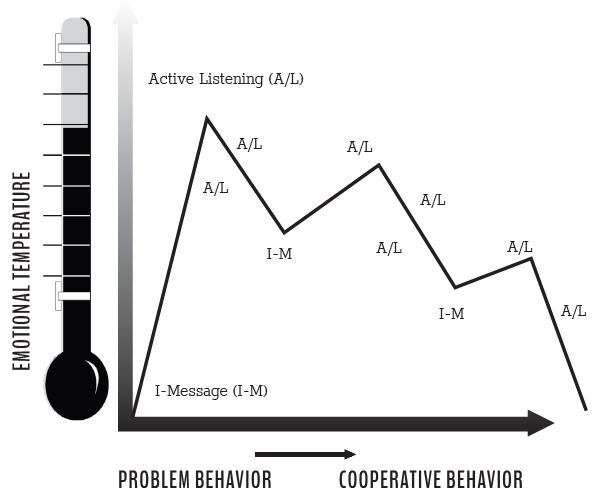I learned about Confrontive I-Messages in P.E.T. and here’s a real-life story of my experience confronting one of my sons. Last week, I got home after work, and saw that the back door was wide open. It was really hot outside and the air conditioning was running – trying to keep up with all the warm air coming in. I saw my son playing with his friend in the backyard, so I thought of my best Confrontive I-Message to send him.
You: “Hey bud. When I come home and see the back door wide open with the air conditioning running, I’m feeling irritated because I’ll have to pay more on the next energy bill.”
I had all of the necessary components of the I-Message: the unacceptable behavior of my child (leaving the door open), the tangible effect the behavior has on me (higher bill to pay), and my feelings about those effects (irritated).
But instead of closing the door, he became upset and defensive.
My son’s response to my I-Message: “But I’m playing soccer with Patrick and I’m about to win this game!”
My not-so-hot response: “Well uh, that’s great, but you still need to shut the door.” (And I shut the door–okay, I kind of slammed it shut–feeling annoyed and dissatisfied.)
I think to myself, “Well, that could’ve gone better. ” And I then remembered my P.E.T. skills and what to do when you meet resistance after sending an I-Message. In the P.E.T. Workbook, Dr. Gordon says:
“While I-Messages produce less defensiveness from children than You-Messages, it’s obvious that nobody welcomes hearing that his behavior is causing someone else a problem, no matter how the message is phrased. Even the best constructed I-Message may cause your child to feel hurt, sorry, surprised, embarrassed, defensive, argumentative, or even tearful. After all, he has received a message loud and clear, that his behavior is unacceptable, troublesome or hurtful to you.
Often, your child’s first reaction will be one that lets you know that now he has a problem. [Looking at the Gear-Shifting diagram, he would have a high “emotional temperature”.]
You will almost always defeat your purpose if you continue to repeat your I-Message when your child reacts negatively to it. If you do, his emotional temperature will go even higher and he will resist hearing you even more strongly.
To increase the chances that your child will hear your I-Message, you’ll need to Active Listen and acknowledge his upset feelings. This shifting helps the child deal with his newly created problem and it also demonstrates the parent’s understanding and acceptance of the child’s reactions. It says: “I see that you’re upset and I want to hear you.” Listening gives the child a vent for his feelings, a chance to go deeper and if necessary an opportunity to do problem-solving. It lowers your child’s emotional temperature.
So as soon as you become aware that your I-Message has caused a problem for your child, you’ll want to shift gears from talking to listening. It’s a temporary shift and doesn’t mean that you are letting go of your needs, but it shows that you are interested in his needs and feelings as well. When your child feels heard and accepted, the chances are much greater that he will be able to hear and accept your I-Message.
Okay, so after their game was over and his friend went home, I asked my son to sit with me and I tried again:
Me: “Okay so I wanted to talk with you about the door and air conditioning. Here’s my concern: I don’t want to spend extra money on our energy bill and when you leave the door open when it’s so hot, the A/C runs and runs and that worries me and it’s also irritating.
Son: “I know….you said that already!”
Me: “You are annoyed that I am bringing this up again.”
Son: “Yeah, and like I said, I was trying super hard to beat Patrick.”
Me: “You were so close to winning the game, that you really didn’t want to take the chance of losing your focus.”
Son: “Yes! And Patrick always beats me!”
Me: “You would really like to beat him for once.”
Son: “Yeah!”
I then re-confront: “Okay, well, here’s the thing…when you leave the door open with the air conditioning on, the A/C has to run constantly since it’s so hot outside, so I’ll have to spend more money on next month’s bill and we need to stick to a budget.”
Son: “Oh…..okay, sorry dad. I’m gonna really try to make sure I close it when it’s hot…and….maybe I can make a sign and tape it to the door to remind me.”
Me: “Well, I think that’s an awesome idea….and I appreciate that, buddy!”
While this is not a crisis or a huge problem, it did remind me of how quickly a situation could become bigger and become stalled if I don’t take the time to step back and listen instead of literally, slamming the door on the issue.
Score one for the home team!

